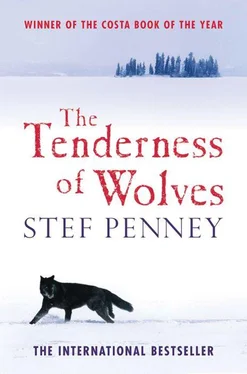A prank. Youthful high spirits.
But somehow the man had died. Knox knew of at least one youth who was unquestionably involved in the business, but no one, despite their regret, would speak out. A prank gone wrong? Scott had not seen the man’s suffused face; the wires cutting savagely into bloated ankles. Andrew Knox feels unable to exempt a whole race from suspicion on the grounds that they are incapable of cruelty.
He has become aware of the sounds beyond the window. Outside his walls there may be a force of evil. Perhaps the sort of cunning that would think to scalp a man to throw suspicion onto those of a different colour. Please God, not a Caulfield man. And what motive can there have been for this death? Surely not the theft of Jammet’s old and ill-used possessions. Did he have a secret cache of wealth? Did he have enemies among the men he traded with–perhaps an unpaid debt?
He sighs, dissatisfied with his thoughts. He had been so sure that seeing the cabin would provide him with clues, if not answers, but he is left with less certainty than before. It hurts his vanity to admit that he could not read the signs, especially in front of Mrs Ross–a provoking woman who always makes him feel uncomfortable. Her sardonic gaze never softened, even when describing her appalling discovery, or confronting it for the second time. She is not popular in the town, for she gives the impression of looking down her nose at people, although by all accounts (and he has heard some pretty hair-raising gossip) she has nothing to be conceited about. However, to look at her and to recall some of these lurid stories is to find them incredible: she has a regal bearing, and an admittedly handsome face, although her prickly manner is not compatible with true beauty. He had been aware of her eyes on him when he stepped up to the corpse to feel for warmth. He could barely keep his hand from trembling–there seemed to be no flesh free from blood to touch. He took a deep breath (which only made him feel nauseous) and placed his fingers on the dead man’s wrist.
The skin was cold, but felt otherwise human, normal; like his own skin. He tried to keep his eyes off the terrible wound but, like the flies, they seemed unable to stay away. Jammet’s eyes stared up at him, and it occurred to Knox that he was standing where the killer must have stood. He hadn’t been asleep, not at the end. He felt he ought to close the eyes but knew he wouldn’t be able to do so. Shortly afterwards he fetched a sheet from upstairs and covered the body. The blood was dry and wouldn’t stain, he said–as if it mattered. He tried to cover his confusion with another practical remark, hating the hearty sound of his own voice as he did so. At least tomorrow it will not be his sole responsibility any more–the Company men will arrive and, probably, they will know what to do. Probably, something will become apparent, someone will have seen something, and by evening it will have been solved.
And with this spurious hope, Knox tidily rearranges the papers into a pile and blows out the lamp.
It is past midnight, but I sit up with a lamp and a book I am unable to read, waiting for a footstep, for the door to open and cold air to fill the kitchen. I find myself thinking yet again about those poor girls. Everyone in Dove River and Caulfield knows the story, and it is recounted to anyone who comes here, or repeated over and again with subtle variations on winter evenings in front of the fire. Like all the best stories, it is a tragedy.
The Setons were a respectable family from St Pierre La Roche. Charles Seton was a doctor, and his wife Maria a recent Scottish immigrant. They had two daughters who were their pride and joy (as they say, though when are children ever not?). On a mild day in September Amy, who was fifteen, and Eve, thirteen, set off with a friend called Cathy Sloan to gather berries and picnic by the banks of a lake. They knew the way, and all three girls had been brought up in the bush, were familiar with its dangers and respected its code: never stray from the paths, never stay out after dusk. Cathy was exceptionally pretty, famous in the town for her looks. This detail is always added, as though it makes what happened even more tragic, although I cannot personally see that it matters.
The girls set off with a basket of food and drink at nine in the morning. At four, the time by which they should have returned, there was no sign of them. Their parents waited a further hour, then the two fathers set out to trace their daughters’ footsteps. After zigzagging around the path, calling constantly, they arrived at the lake, and searched, still calling, until after dark, but found no sign of them. Then they returned, thinking it possible that their daughters had taken another route and had by now arrived home, but the girls were not there.
A massive search was got up, and everyone in the town turned out to help look for the children. Mrs Seton took to fainting fits. On the evening of the second day, Cathy Sloan walked back into St Pierre. She was weak and her clothes were filthy. She had lost her jacket and one of her shoes, but was still holding the basket that had contained their lunch; apparently now (grotesque detail and probably untrue) it was full of leaves. The searchers redoubled their efforts, but they never found a thing. Not a shoe, not a scrap of clothing, not even a footprint. It was as though a hole had opened in the ground and swallowed them up.
Cathy Sloan was put to bed, although whether she was actually ill was a moot point. She said that she had had some sort of argument with Eve shortly after setting off, and had dawdled behind the other two until losing them from sight. She walked to the lake and called for them, thinking they were mean to have hidden from her. She became lost in the woods and could not find the path. She never saw the Seton sisters again.
They townspeople went on searching, sending delegations to the nearby Indian villages, for suspicion fell on them as naturally as rain falls on the ground. But not only did they swear their innocence on the Bible, there was not a scrap of evidence of a kidnapping. The Setons looked further and further afield. Charles Seton hired men to help him look, including an Indian tracker and then, after Mrs Seton had died, seemingly of a broken heart, a man from the States who was a professional searcher. The searcher travelled to Indian bands all over Upper Canada and beyond, but found nothing.
Months became years. At the age of fifty-two Charles Seton died, exhausted, penniless and at a loss. Cathy Sloan was never quite the beauty she had been; she seemed dull and stupid–or had she always been that way? No one could any longer remember. The story of the case spread far and wide, and then passed into legend, recounted by schoolchildren with wild inconsistencies, told by frazzled mothers to curb their children’s wandering. Wilder and wilder theories grew up as to what had happened to the two girls; people wrote from far-flung addresses claiming to have seen them, or married them, or to be them, but none ever proved well founded. In the end, no explanation could possibly fill the void left by the disappearance of Amy and Eve Seton.
All that was fifteen years ago or more. The Setons are both dead now; first the mother died of grief, then the father, bankrupt and exhausted by his relentless quest. But the story of the girls belongs to us because Mrs Seton’s sister is married to Mr Knox, and that is why we fell into a guilty silence when she came into the store that day. I do not know her particularly well, but I do know that she never speaks of it. Presumably, on winter evenings in front of the fire, she talks of something else.
People disappear. I’m trying not to assume the worst, but all the lurid theories about the girls’ disappearance are haunting me now. My husband has gone to bed. Either he isn’t worried, or he is indifferent–it is years since I could tell what he was thinking. I suppose that is the nature of marriage, or perhaps it just goes to show that I am not very good at it. My neighbour Ann Pretty would probably incline towards the latter; she has a thousand ways of implying that I am deficient in my wifely duties–when you think of it, an astonishing feat for a woman of such little sophistication.
Читать дальше












